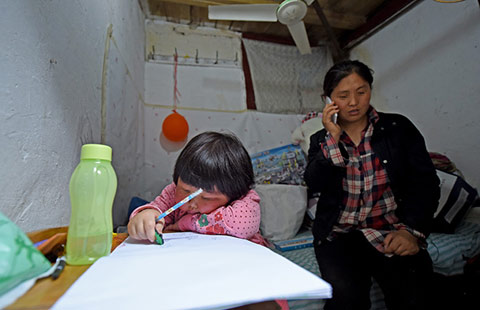The tribunal's award in the 'South China Sea Arbitration' initiated by the Philippines is null and void
By Chinese Society of International Law (www.csil.cn) Updated: 2016-06-10 14:30IV. The Arbitral Tribunal disregards the fact that there exist between China and the Philippines agreements to settle the relevant disputes through negotiation, distorts Article 281 of the UNCLOS, and erroneously exercises jurisdiction over the claims
The Tribunal's exercise of jurisdiction over the Philippines' claims is subject to fulfillment of the terms in Article 281 of the Convention. This article provides that "if the Parties have agreed to seek settlement of the dispute by a peaceful means of their own choice", the procedures provided for in Part XV apply "only where no settlement has been reached by recourse to such means and the agreement between the parties does not exclude any further procedure" (UNCLOS, art.281(1), emphasis added). According to the provision, prior to a finding of jurisdiction, the Tribunal must examine whether there exists such an "agreement" between China and the Philippines to settle disputes through the means of their own choice, and if there does, whether the "agreement" excludes "any further procedure", including, inter alia, arbitration.
What is the "agreement" under Article 281 of the UNCLOS? The provision employs the term "agreement" without prescribing any limitation on form. The terms of "have agreed to" and "agreement", as interpreted in accordance with their ordinary meaning pursuant to the rule of interpretation as reflected in Article 31 of the 1969 Vienna Convention on the Law of Treaties, refer to the unanimous expression of intentions or consensus. They stress the act of consensus itself, rather than the form or vehicle which gives expression to the consensus. The parties would have an "agreement" within the meaning of Article 281 in so far as they have a consensus on their own will, be it expressed in oral or written form, embodied in a treaty or another international instrument, in the form of one or multiple instruments, or in specific provision(s) in one or more instruments. Once the parties "have agreed to" settle their disputes through the means of their own choice, they bear the international obligation to act in line with such "agreement", according to the UNCLOS.
There exists an "agreement" within the meaning of Article 281 of the UNCLOS between China and the Philippines. This is evident from a series of bilateral instruments issued jointly by China and the Philippines and the Declaration on the Conduct of Parties in the South China Sea ("DOC") jointly signed by both States, which confirm the consensus of settling disputes in the South China Sea through consultations and negotiations.
For instance, under the Joint Statement between the People's Republic of China and the Republic of the Philippines concerning Consultations on the South China Sea and on Other Areas of Cooperation, issued on 10 August 1995, both sides "agreed to abide by" the principles that "[d]isputes shall be settled in a peaceful and friendly manner through consultations on the basis of equality and mutual respect" (Point 1, emphasis added); that "a gradual and progressive process of cooperation shall be adopted with a view to eventually negotiating a settlement of the bilateral disputes" (Point 3, emphasis added); and that "[d]isputes shall be settled by the countries directly concerned without prejudice to the freedom of navigation in the South China Sea" (Point 8, emphasis added).
The Joint Statement of the China-Philippines Experts Group Meeting on Confidence-Building Measures, issued on 23 March 1999, states that "the two sides ... have agreed that the dispute should be peacefully settled through consultation" (para.12, emphasis added).
The Joint Statement between the Government of the People's Republic of China and the Government of the Republic of the Philippines on the Framework of Bilateral Cooperation in the Twenty-First Century, issued on 16 May 2000, states in Point 9 that, "[t]he two sides commit themselves to the maintenance of peace and stability in the South China Sea. They agree to promote a peaceful settlement of disputes through bilateral friendly consultations and negotiations in accordance with universally-recognized principles of international law, including the 1982 United Nations Convention on the Law of the Sea. They reaffirm their adherence to the 1995 joint statement between the two countries on the South China Sea" (emphasis added).
The mutual understanding between China and the Philippines to settle relevant disputes through negotiation has also been reaffirmed in a regional multilateral instrument. On 4 November 2002, Mr. Blas F. Ople, the then Secretary of Foreign Affairs of the Philippines, the Ministers or Secretaries of Foreign Affairs of the other nine Member States of the Association of Southeast Asian Nations ("ASEAN"), and Mr. Wang Yi, the then Vice Foreign Minister and representative of the Chinese Government jointly signed the DOC. Paragraph 4 of the DOC explicitly states that, "[t]he Parties concerned undertake to resolve their territorial and jurisdictional disputes by peaceful means ... through friendly consultations and negotiations by sovereign states directly concerned, in accordance with universally recognized principles of international law, including the 1982 UN Convention on the Law of the Sea" (emphasis added).
Since then, the leaders of China and the Philippines have repeatedly reiterated in various documents their commitment to actively implement or comply with provisions of the DOC, including its Paragraph 4 concerning the obligation to settle their disputes through negotiation. A Joint Press Statement between the Government of the People's Republic of China and the Government of the Republic of the Philippines was issued on 3 September 2004 during the State visit to China by Gloria Macapagal-Arroyo, the then Philippine President, which states that, "[t]hey agreed that the early and vigorous implementation of the 2002 ASEAN-China Declaration on the Conduct of Parties in the South China Sea will pave the way for the transformation of the South China Sea into an area of cooperation" (Paragraph 16, emphasis added). A Joint Statement between the People's Republic of China and the Republic of the Philippines was made on 1 September 2011 during the State visit to China by President Benigno S. Aquino III, which "reiterated their commitment to addressing the disputes through peaceful dialogue" and "reaffirmed their commitments to respect and abide by the Declaration on the Conduct of Parties in the South China Sea signed by China and the ASEAN member countries in 2002" (Paragraph 15, emphasis added). This Joint Statement reaffirmed Paragraph 4 of the DOC on settlement of relevant disputes by negotiations.
On 1 August 2014, the Philippine Department of Foreign Affairs made a proposal, calling on the parties to the DOC to comply with Paragraph 5 of the DOC and to provide "the full and effective implementation of the DOC".
The repeated employment of such terms as "agree", "undertake" and "shall" in the above documents, when referring to the settlement of disputes through negotiation, evinces a clear intention to establish an obligation between the two States in this regard. The relevant provisions are mutually reinforcing and make clear the existence of a consensus on establishing international obligations. It shows that there is an "agreement" between China and the Philippines on the means of dispute settlement.
At the same time, China and the Philippines have excluded, in their "agreement" under Article 281 of the UNCLOS, any other procedures of dispute settlement, including arbitration. The Convention does not specify what amounts to exclusion of "any further procedure". The Tribunal held that "the better view is that Article 281 requires some clear statement of exclusion of further procedures" (Award, para.223). This assertion is untenable. Whether an exclusion is made in an agreement essentially depends on the genuine intentions of the parties, rather than the specific form of expression. As the arbitral tribunal in the Southern Bluefin Tuna Case stated in its Award of 2002, "the absence of an express exclusion of any procedure … is not decisive" (Southern Bluefin Tuna Case (Australia and New Zealand v. Japan), Award on Jurisdiction and Admissibility, 4 August 2000, para. 57). The intention of both China and the Philippines to exclude third-party dispute settlement procedures, including arbitration, is clear from relevant provisions of the bilateral instruments between China and the Philippines and the DOC.
By repeatedly emphasizing that any disputes in the South China Sea must be settled through negotiation between sovereign States directly concerned, the bilateral instruments and Paragraph 4 of the DOC obviously have produced the effect of excluding any means of third-party dispute settlement procedure. For instance, the Joint Statement between the People's Republic of China and the Republic of the Philippines concerning Consultations on the South China Sea and on Other Areas of Cooperation of 10 August 1995 stipulates in Point 3 that "a gradual and progressive process of cooperation shall be adopted with a view to eventually negotiating a settlement of the bilateral disputes" (emphasis added). The term "eventually" in this context clearly serves to emphasize that "negotiation" is the only means the parties have chosen for dispute settlement, to the exclusion of any other means including third-party settlement procedures. The Joint Statement between the Government of the People's Republic of China and the Government of the Republic of the Philippines on the Framework of Bilateral Cooperation in the Twenty-First Century, issued on 16 May 2000, reaffirms in Point 9 "their adherence to the 1995 joint statement between the two countries on the South China Sea". As another piece of evidence for the intention behind Paragraph 4 of the DOC to exclude other procedures, Vietnam stated that all disputes relating to the South China Sea "must be settled through peaceful negotiations, in accordance with international law, especially the 1982 United Nations Convention on the Law of the Sea and the Declaration on the Conducts of Parties in the South China Sea (Eastern Sea) - DOC" in a note verbale to the Secretary-General of the United Nations on 18 August 2009 (emphasis added).
China adheres to the principle of peaceful settlement of international disputes, and respects the right of other States to freely choose the peaceful means of dispute settlement. On issues concerning territorial sovereignty and maritime rights and interests, it is China's long-standing foreign policy and consistent practice to settle the disputes peacefully through negotiation and consultation, and not to accept any compulsory third-party procedures. There has never been any exception to this policy and practice. This position of China is based on the practical consideration that the "consensus" of the parties is the foundation for resolving any disputes, and is inherent in the centuries-long Chinese cultural tradition that advocates "harmony being the most precious" and "non-litigation". This position was made clear and is well known to the Philippines and other relevant parties during the drafting and adoption of the aforementioned bilateral instruments and the DOC.
To summarize, relevant provisions in a series of bilateral instruments and the DOC reflect an "agreement" between China and the Philippines under Article 281 of the UNCLOS, which excludes any other procedures. The two parties thus have the international obligation to settle their disputes through negotiation, and neither shall resort to compulsory procedures such as arbitration.
The Tribunal holds that neither the bilateral instruments nor the DOC constituted binding agreements between China and the Philippines (See Award, paras.217, 245). It proceeds to determine that there exists no agreement between the two States on the means of dispute settlement within the meaning of Article 281 of the UNCLOS. This is a distortion of the term "agreement" in Article 281 of the UNCLOS which stresses the act of consensus itself, rather than its form. The Tribunal's determination of the existence of agreement is based on the form and vehicle of the expression of will, and neglects that the essence of "agreement" is the act of consensus itself. This approach of the Tribunal runs counter to the ordinary meaning of the relevant provisions of the UNCLOS and its drafters' intention.
- Chinese Embassy refutes Wall Street Journal's editorial on South China Sea
- China, ASEAN nations vow to effectively implement DOC on South China Sea
- Government of the Republic of Kenya statement on South China Sea
- The South China Sea dispute: Beijing's view
- How to bridge the divide over the South China Sea
- Navy sailing near Diaoyu 'legitimate'
- Girl's view of Beijing captured in pic book
- Witness recalls trial of Japanese war criminals 60 years ago
- Small Chinese brands gain big names overseas
- Australia teacher finds unexpected online fame in China
- More schools may look to offer robotics
- Survey rings obesity alarm as kids growing bigger
- Premier vows to create transparent, fair market for foreign investors
- Top court announces it will retry old rape and murder case
- Manila urged to quit arbitration








